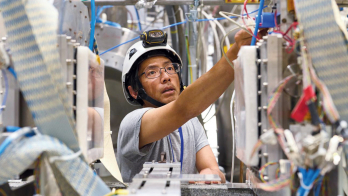CERN’s member states have adopted a new protocol on the privileges and immunities of the organization. This brings CERN into line with other European intergovernmental organizations, such as the European Space Agency and the European Southern Observatory, which already enjoy international status in all their member states.
The protocol, which is also open for signature to non-member states that have agreements with CERN, will simplify the movement of personnel and materials between countries involved in projects with CERN. The privileges and immunities granted to CERN are similar to those granted to other international organizations. The protocol will also facilitate any future enlargement of the organization.
CERN already benefits from international status in its two host states, France and Switzerland. Switzerland accorded this status in 1955, as did France after the CERN site was extended across the Franco-Swiss border in 1965. With the new protocol, all member states that sign will recognize CERN’s international status.
When it comes into force, the protocol will have important effects for the organization’s activities in other countries, particularly those involving contractors or collaborators in other research institutes. For example, by establishing specific privileges and immunities, it will make easier the movement of personnel between countries involved in projects in which CERN is a partner. It will also exempt CERN’s purchasing activities from tax (in particular VAT) and customs duties, and thus simplify the transfer of equipment and materials between the various countries that can be involved in a single contract – with the effect of reducing the costs often incurred through successive taxations as goods move between countries.
The protocol also has an important symbolic value for the future of CERN, as it is open for signature not only to CERN’s member states, but also to other states that collaborate with CERN, either as associate member states or through co-operation agreements. “Although this seems symbolic today,” explains CERN’s director-general Robert Aymar, “I believe that in the future, with the increasing globalization of particle physics, this will become a valuable tool in helping CERN to remain a powerful force in science.”
Nine member states signed the protocol in a ceremony at CERN on 18 March, bringing to 11 (with France and Switzerland) the number of member states that have now agreed to grant full international status to CERN. The other nine have set in motion procedures that will allow them to sign in the near future. It will come into force once it has been signed and ratified by 12 member states other than the host states.








